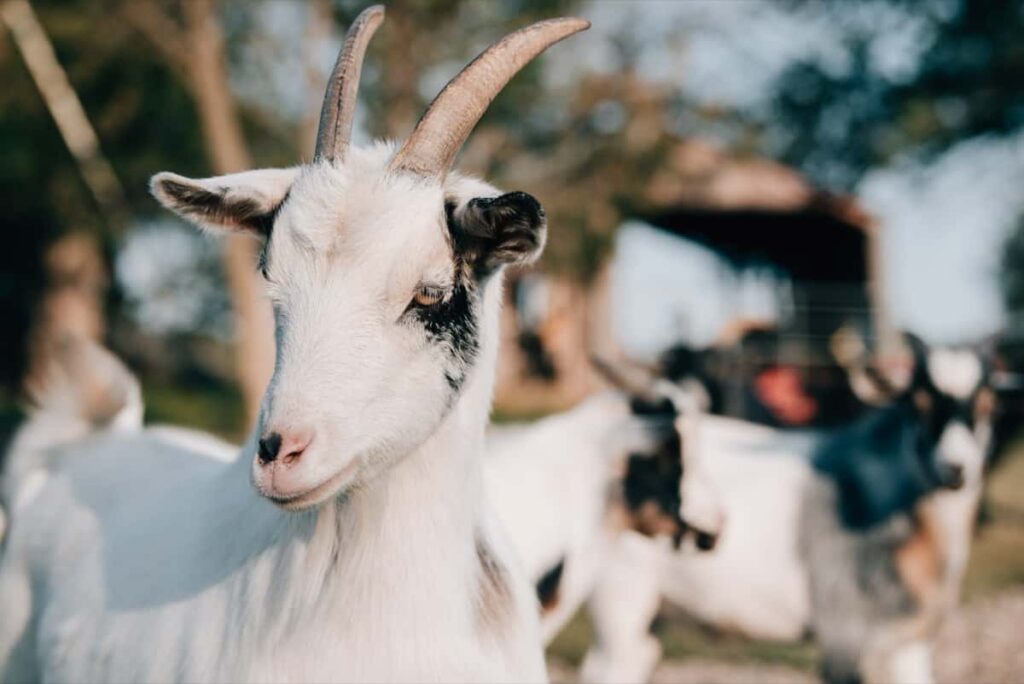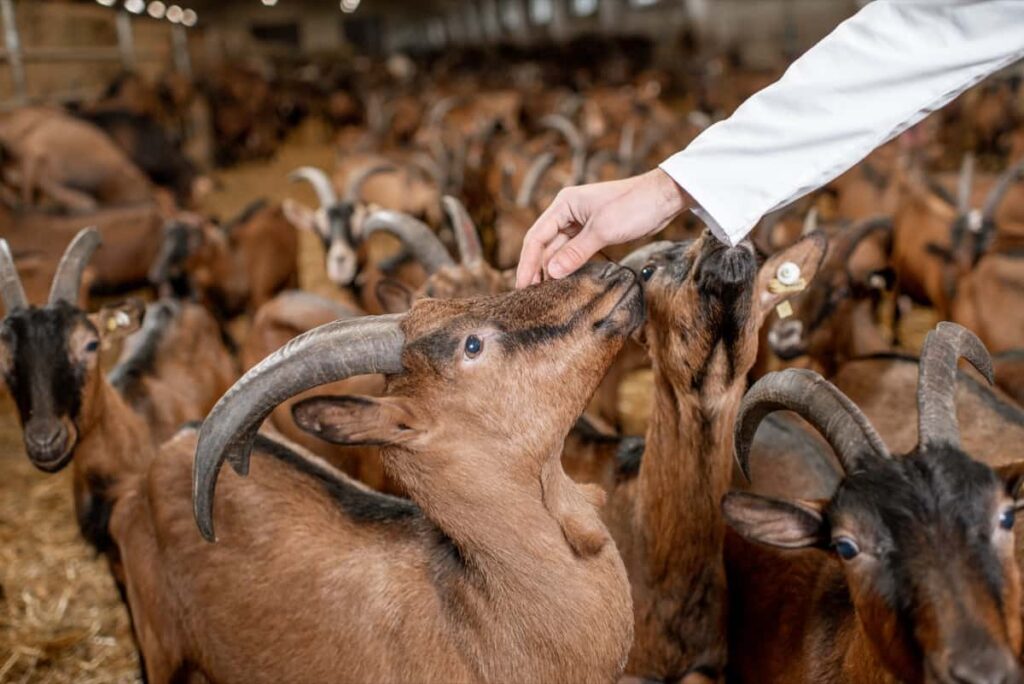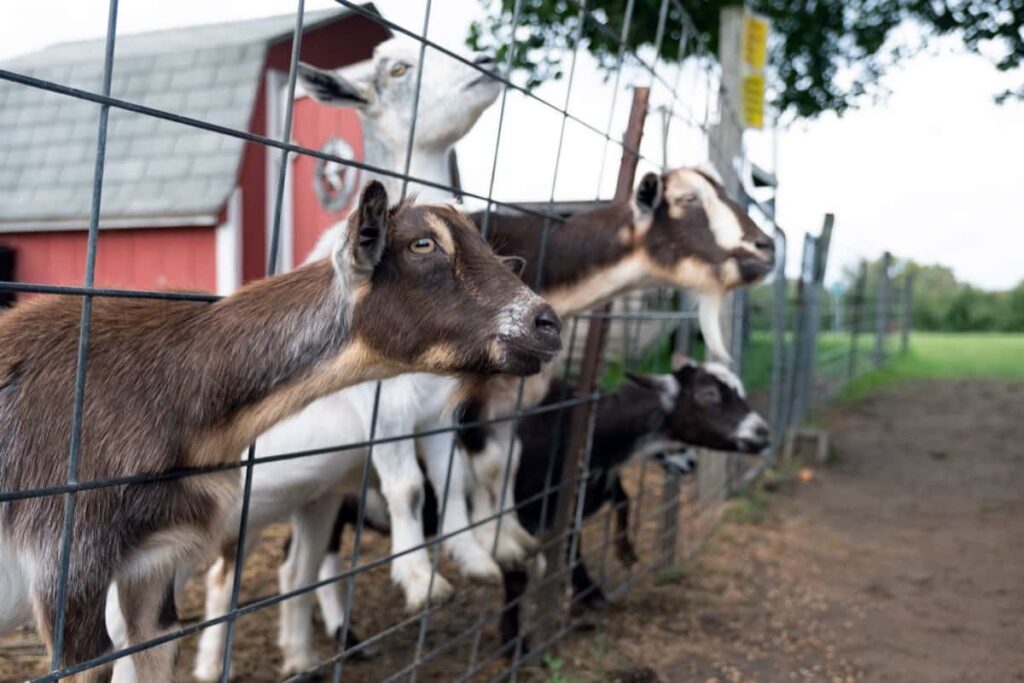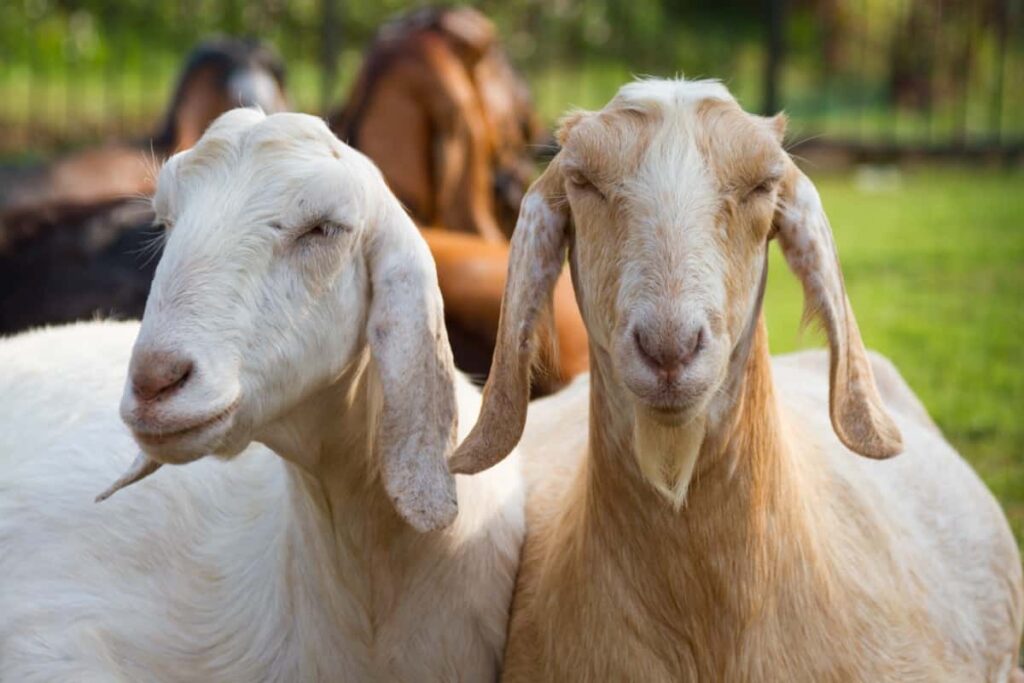Goat farming is the practice of raising and breeding goats for various purposes, such as meat, milk, fiber, and manure. It is a lucrative agricultural venture practiced for centuries in many parts of the world, including Ghana. Moreover, goat farming contributes significantly to food security in Ghana. In Ghana, goat farming is primarily practiced by small-scale farmers who rear goats for meat production. However, there is also a growing market for dairy goat farming and breeding purposes.

10 Steps to Goat Farming in Ghana
Housing and Infrastructure for Goat Farming in Ghana
When it comes to goat farming in Ghana, providing proper housing and infrastructure is crucial for the well-being and productivity of your goats. A suitable housing setup will protect your goats from harsh weather conditions, predators, and diseases. You need to consider the size of your farm and determine how many goats you plan to raise.
This will help you decide on the appropriate size of your goat house or shed. Ideally, each adult goat should have at least 10-15 square feet of space. Fencing is essential to keep your goats within their designated areas and out of potential predators like dogs or wild animals. Use sturdy wire mesh fencing with small gaps to prevent escapes or intrusions from other animals.
Developing a Business Plan for Goat Farming in Ghana
Conducting thorough market research is essential. Understand the demand for goat products in Ghana and identify potential customers such as local markets, restaurants, and wholesalers. This analysis will help you determine the scale of your operation and set realistic sales targets. Next, consider your target audience. Understanding consumer preferences will allow you to tailor your products accordingly and carve out a niche within the market.
Financial planning is another vital aspect of developing a business plan. Estimate costs for purchasing land or leasing space, acquiring goats, feed expenses, veterinary care, marketing efforts, and other overheads involved in running a successful farm. Furthermore, outline your marketing strategy to ensure effective promotion of your product offerings.
Consider digital advertising channels like social media platforms or partnerships with local businesses to help distribute your products. Identify potential risks, such as disease outbreaks or natural disasters, that may impact your operations and develop contingency plans to mitigate these risks.
Choosing the Right Goat Breeds for Farming in Ghana
Choosing the right breed of goats plays a crucial role in ensuring profitability. Some popular breeds suitable for farming in Ghana include the Black Bengal Goat, Boer Goat, Kalahari Red Goat, Kiko Goat, Fainting Goat, Nubian Goat, Rangeland Goat, and Sirohi Goat.
Feeding and Nutrition Management for Goats in Ghana
To ensure the health and productivity of your goats, it is important to provide them with a balanced diet. Goats are herbivores, which means they primarily feed on plants. They can consume various forage types such as grasses, legumes, browse, and weeds. Providing them access to high-quality pasture or grazing areas where they can freely graze is essential.
In case you missed it: 10 Steps to Start Goat Farming in UAE: License, Permits, and Business Plan

In addition to grazing, goats also require supplemental feeding. Another vital aspect of goat nutrition management is ensuring they receive adequate water. Goats need access to clean drinking water, especially during hot weather when they require more water intake. Proper mineral supplementation is also essential for goats’ overall health and well-being.
Licensing Requirements for Goat Farming in Ghana
These regulations are put in place to ensure that farms operate legally and meet certain standards. To begin with, you will need to register your farm with the appropriate government agency. This involves providing information about your farm location, number of goats, and other relevant details. Additionally, you may need to obtain a livestock permit from the Ministry of Food and Agriculture. This permit allows you to keep and breed goats on your farm. It is essential for maintaining proper records of your flock and ensuring their health and welfare.
Furthermore, it is important to comply with any zoning laws or land use regulations that may apply in your area. Some regions have specific guidelines regarding where agricultural activities can take place. By understanding and adhering to these licensing requirements for goat farming in Ghana, you can ensure that your business operates within legal boundaries while promoting sustainable practices for a thriving industry.
Obtaining Permits for Goat Farming in Ghana
Ghana’s government has regulations to ensure livestock’s proper management and welfare, including goats. To obtain permits for goat farming, you will need to visit the appropriate government agencies responsible for agriculture or livestock. These agencies can provide the necessary information and application forms to start the process. Be prepared to submit documentation such as your business plan, proof of land ownership or lease agreement, environmental impact assessment report, and any other required documents.
It is important to note that different regions within Ghana may have specific requirements or additional permits for goat farming. Therefore, it is advisable to research and consult with local authorities before proceeding. The permit application process may involve inspections of your farm premises by officials from relevant departments. They will assess factors such as housing facilities, availability of clean water sources, waste management systems, and adherence to animal welfare standards.
Health and Disease Management in Goat Farming in Ghana
Regular vaccinations are essential to protect your goats from common diseases such as pneumonia, foot rot, and brucellosis. A balanced diet is important for maintaining strong immune systems in goats. Please provide them with quality hay, grains, minerals, and fresh water. Keep your barn clean and provide proper ventilation to prevent bacteria or viruses. Regularly disinfect equipment, feeding troughs, and water containers.
Before introducing new goats into your herd, isolate them for at least two weeks to monitor their health status and prevent potential infections from spreading. Monitor your goats closely for signs of illness or distress, such as weight loss, diarrhea, coughing, or lameness. Seek veterinary assistance promptly if any issues arise. Implement an effective pest control program to prevent infestation by external parasites like ticks or lice that can cause stress-related illnesses in goats.
In case you missed it: Ibex Wild Goat Profile: Origin, History, and Physical Characteristics

Market Analysis and Demand for Goat Products in Ghana
Understanding the market demand is crucial when starting a goat farming business in Ghana. This analysis helps you identify potential customers and target your products accordingly. Ghana has a large population relies on goat meat as a source of protein. In addition to local consumption, there is a growing export market for goat products from Ghana.
To stay competitive in this industry, conducting regular market research to know consumer preferences and trends is important. This will help you adapt your production methods and product offerings accordingly.
Marketing and Selling Goat Products in Ghana
Marketing and selling goat products in Ghana can be profitable for farmers. To effectively market your goat products, it is essential to identify your target audience. This could include local restaurants, supermarkets, hotels, and consumers who prefer organic and locally sourced products. One effective marketing strategy is to showcase the quality of your products. Highlight the natural feeding methods used on your farm and emphasize that your goats are raised under ethical practices.
This will appeal to health-conscious consumers who value sustainable farming. In addition to traditional marketing channels like word-of-mouth referrals and flyers, consider utilizing digital platforms such as social media and online marketplaces. Create an engaging website or social media page to share updates about your farm practices and promote special offers or discounts.
Cost to Set Up Goat Farm in Ghana
Setting up a goat farm in Ghana typically requires an investment ranging from 80,000 to 100,000 Ghanaian Cedis. This amount covers the costs of acquiring suitable land for grazing or constructing housing facilities if needed. Additionally, it includes expenses related to building adequate shelters for your goats and purchasing appropriate equipment like feeding troughs and water containers.
Summary of Starting Goat Farming in Ghana
| Steps to start goat farming | Description |
| Housing and Infrastructure | Provide adequate housing facilities, ensuring proper ventilation, cleanliness, space requirements, etc. |
| Choosing the Right Goat Breeds | Select suitable breeds based on their adaptability to local conditions and raising purpose (meat or dairy). |
| Developing a Business Plan | Create a goat farming business plan outlining your goals, finances, marketing strategies, etc. |
| Feeding and Nutrition Management | Develop an appropriate feeding regimen considering the nutritional requirements of goats at different stages. |
| Licensing Requirements | Familiarize yourself with the licenses and permits required to operate a goat farm legally. |
| Obtaining Permits | Specific permits are needed from relevant authorities to establish your farm. |
| Market Analysis and Demand | Analyze market trends and demand for various goat products. |
| Health & Disease Management | Implement preventive measures such as regular vaccinations to maintain good health. |
| Marketing & Selling Goats | Effective marketing strategies to reach potential customers through various channels |
In case you missed it: How to Select Goats for Milk or Meat: A Simple Guide with Best Tips and Techniques

Conclusion
Goat farming is the practice of rearing goats for various purposes, such as meat production, milk production, and even fiber. Goat farming in Ghana offers many advantages, making it a lucrative business opportunity. Goats are known for their remarkable adaptability to different climates and environments, making them suitable for diverse regions in Ghana. They are also relatively low maintenance compared to other livestock animals.
- Types of Grass Growing for Goat Farm
- How to Train Goats for Milking: A Beginners Guide
- Goat Milking Practices and Equipment: A Beginner’s Guide
- Goat Farming for Fiber: Producing Mohair and Cashmere
- Maximizing Goat Milk Production: Tips for Dairy Goat Farmers
- Goat Farming as a Family Business: Strategies for Success
- Profitable Kenya Goat Breeds for Commercial Dairy and Meat Business
- Unlock the Secrets of Oberhasli Goat: Discover Raising and Management Practices
- Ultimate Guide to Myotonic Goats: Explore Profile to Raising